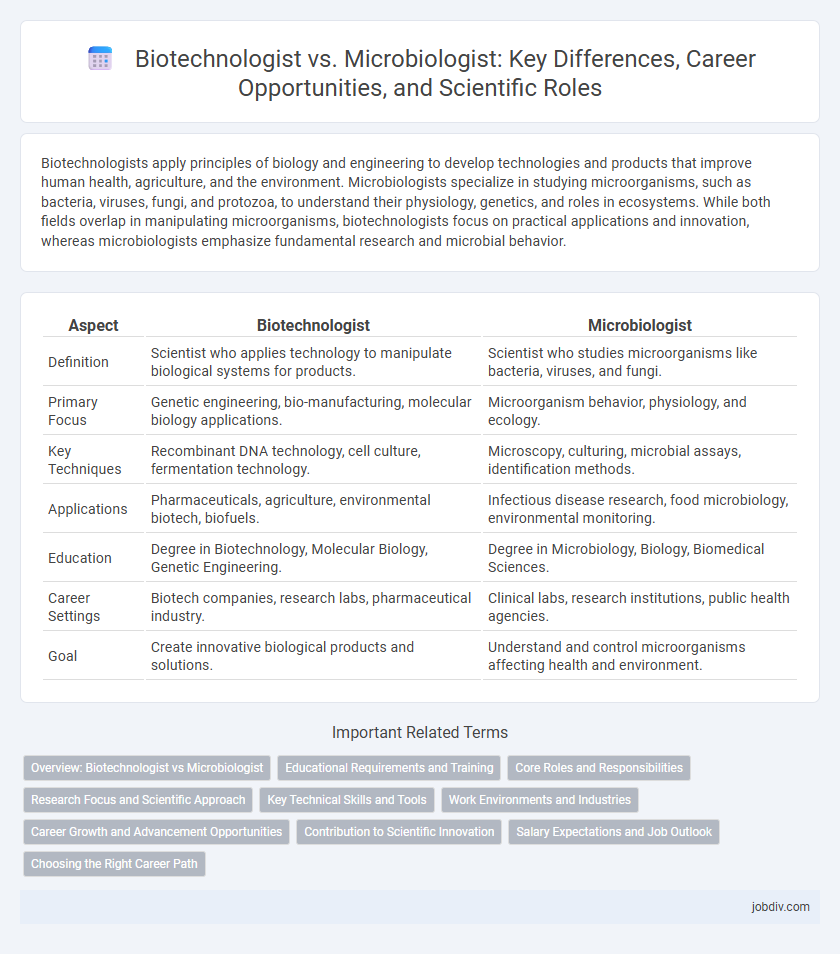Biotechnologists apply principles of biology and engineering to develop technologies and products that improve human health, agriculture, and the environment. Microbiologists specialize in studying microorganisms, such as bacteria, viruses, fungi, and protozoa, to understand their physiology, genetics, and roles in ecosystems. While both fields overlap in manipulating microorganisms, biotechnologists focus on practical applications and innovation, whereas microbiologists emphasize fundamental research and microbial behavior.
Table of Comparison
| Aspect | Biotechnologist | Microbiologist |
|---|---|---|
| Definition | Scientist who applies technology to manipulate biological systems for products. | Scientist who studies microorganisms like bacteria, viruses, and fungi. |
| Primary Focus | Genetic engineering, bio-manufacturing, molecular biology applications. | Microorganism behavior, physiology, and ecology. |
| Key Techniques | Recombinant DNA technology, cell culture, fermentation technology. | Microscopy, culturing, microbial assays, identification methods. |
| Applications | Pharmaceuticals, agriculture, environmental biotech, biofuels. | Infectious disease research, food microbiology, environmental monitoring. |
| Education | Degree in Biotechnology, Molecular Biology, Genetic Engineering. | Degree in Microbiology, Biology, Biomedical Sciences. |
| Career Settings | Biotech companies, research labs, pharmaceutical industry. | Clinical labs, research institutions, public health agencies. |
| Goal | Create innovative biological products and solutions. | Understand and control microorganisms affecting health and environment. |
Overview: Biotechnologist vs Microbiologist
Biotechnologists apply principles of biology and technology to develop products and processes that improve health, agriculture, and industry, often working with genetic engineering, fermentation, and bioinformatics. Microbiologists study microscopic organisms such as bacteria, viruses, fungi, and protozoa to understand their physiology, genetics, and interactions with environments, with applications in healthcare, environmental science, and food safety. While both fields overlap in studying microorganisms, biotechnologists emphasize practical applications and product development, whereas microbiologists focus on fundamental biological research and organism behavior.
Educational Requirements and Training
Biotechnologists typically require a bachelor's degree in biotechnology, molecular biology, or a related field, often supplemented by specialized training in genetic engineering, bioprocessing, and bioinformatics. Microbiologists usually pursue a degree in microbiology, biology, or a closely related discipline, with extensive laboratory training focused on microbial physiology, ecology, and pathogen identification techniques. Advanced positions in both fields often demand postgraduate education, such as a master's or PhD, combined with hands-on research experience and proficiency in analytical instrumentation.
Core Roles and Responsibilities
Biotechnologists focus on manipulating biological systems and organisms to develop innovative products and technologies in fields such as agriculture, medicine, and environmental science. Microbiologists study microorganisms like bacteria, viruses, fungi, and protozoa to understand their physiology, genetics, and interactions with environments or hosts. Both roles involve research and experimentation, but biotechnologists primarily apply biological principles for practical solutions, whereas microbiologists emphasize fundamental microbial science and disease mechanisms.
Research Focus and Scientific Approach
Biotechnologists concentrate on applying biological systems and organisms to develop products and technologies, emphasizing genetic engineering, fermentation processes, and molecular biology techniques. Microbiologists primarily study microorganisms such as bacteria, viruses, fungi, and algae, focusing on their physiology, genetics, and interactions within ecosystems. Both fields utilize laboratory research and experimental methods, but biotechnologists often adopt an application-driven approach, whereas microbiologists prioritize understanding microbial life at a fundamental scientific level.
Key Technical Skills and Tools
Biotechnologists specialize in genetic engineering, molecular cloning, and bioinformatics, utilizing tools such as PCR machines, gel electrophoresis apparatus, and bioreactors to manipulate biological systems for industrial and medical applications. Microbiologists focus on microbial identification, culture techniques, and antimicrobial susceptibility testing, employing microscopes, autoclaves, incubators, and spectrophotometers to study microorganisms in environmental and clinical settings. Both professionals require proficiency in sterile techniques and data analysis software but apply these skills toward differing objectives within biological research and development.
Work Environments and Industries
Biotechnologists primarily work in pharmaceutical, agricultural, and environmental sectors, conducting research and development in laboratories, production facilities, and field sites to create products like biofuels and genetically modified organisms. Microbiologists often operate in clinical laboratories, food and beverage industries, and public health organizations, studying microorganisms to improve disease control, food safety, and environmental health. Both professions require specialized lab environments, but biotechnologists are more involved in industrial applications while microbiologists focus on pathogen analysis and microbial ecology.
Career Growth and Advancement Opportunities
Biotechnologists often experience rapid career growth through roles in genetic engineering, pharmaceuticals, and agricultural development, leveraging advancements in molecular biology and bioinformatics. Microbiologists find advancement opportunities in clinical research, environmental science, and industrial microbiology, where expertise in microbial physiology and pathology is crucial. Both professions benefit from interdisciplinary skills and continuing education, with biotechnologists typically advancing into innovation-driven industries and microbiologists excelling in diagnostic laboratories and regulatory agencies.
Contribution to Scientific Innovation
Biotechnologists drive scientific innovation through genetic engineering, developing novel pharmaceuticals, and advancing bioinformatics to enhance healthcare and agriculture. Microbiologists contribute by uncovering microbial mechanisms, identifying new species, and studying microbial interactions critical for antibiotic development and disease control. Their combined efforts accelerate breakthroughs in biotechnology, medicine, and environmental sustainability.
Salary Expectations and Job Outlook
Biotechnologists typically earn higher salaries, with median annual wages around $88,000, reflecting their specialized skills in genetic engineering and pharmaceutical development. Microbiologists have a median salary near $84,000, influenced by roles in healthcare and environmental research sectors. Both fields show positive job outlooks, with projected employment growth rates of approximately 5% to 6% over the next decade, driven by advances in medical research and biotechnology applications.
Choosing the Right Career Path
Biotechnologists apply cellular and biomolecular processes to develop innovative products and solutions in healthcare, agriculture, and environmental sectors, whereas microbiologists study microorganisms to understand their behaviors and impacts on humans, animals, and ecosystems. Choosing the right career involves evaluating interests in applied science and product development for biotechnology versus foundational research and pathogen analysis for microbiology. Both fields require strong backgrounds in biology and laboratory techniques, but biotechnologists often work on genetic engineering and industrial applications, while microbiologists focus on disease control and microbial ecology.
Biotechnologist vs Microbiologist Infographic

 jobdiv.com
jobdiv.com